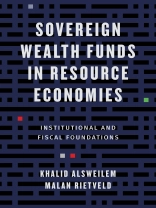Sovereign wealth funds (SWFs) have reached a transitional moment. Created as a way to direct excess wealth toward economic development and long-term financial returns, some countries are now seeing a decline in revenue from sources such as oil. Many SWFs are now facing a new challenge—how to spend sustainably without depleting the funds. Sovereign Wealth Funds in Resource Economies explains the fiscal rules and institutional structures that can make SWFs thrive, providing a practical and theoretical guide to their optimal use in resource-revenue management.
Khalid Alsweilem and Malan Rietveld put forward an institutional perspective of SWFs as quasi-independent political and economic entities charged with managing national resource wealth, examining both investment and disbursement strategies. They advance a systematic, rule-based approach, suggesting when to accumulate and when to begin countercyclical spending based on concrete case studies. More than a mere financial portfolio, SWFs must be embedded in a credible fiscal and institutional framework if they are to contribute to improved economic performance. Alsweilem and Rietveld consider the variety of relationships that exist between SWFs and their governments, exploring the legal and policy side of the institutional approach. Their rule-based description of SWFs, since it allows tailoring and adjustment and invokes rules of thumb and best practices, is intended to be widely applicable across the diverse spectrum of global SWFs. Bringing together the practitioner perspective and scholarly expertise, this book will be invaluable for global policy makers and scholars working with sovereign wealth funds.
Mục lục
Acknowledgments
List of Tables and Figures
Introduction
Part I: An Institutional Perspective on Resource Economies and the Role of Sovereign Wealth Funds
1. The Most Disadvantageous Lottery in the World: Historic Controversies Around Natural Resources and Economic Prosperity
2. Getting to Denmark: Institutional and Political Problems of Resource-Dependent Economies
3. Guardians of the Future Against the Claims of the Present: Sovereign Wealth Funds as an Institutional Response to the Resource Curse
4. To Be Boring: Institutional Lessons from the Modern Monetary Consensus for Sovereign Wealth Funds
Part II: Rule-Based Fiscal Policies for Sovereign Wealth Funds
5. It’s (Still) Mostly Fiscal: Simple Fiscal Rules for Accumulating Windfall Resource Revenues in a Sovereign Wealth Fund
6. Integrated Fiscal Rules for Sovereign Wealth Funds: Spending, Saving, and Stabilizing Resource Revenues
7. Governing the Fiscal Rule: The Design and Institutional Infrastructure of Fiscal Rules for Resource Revenues
Part III: The Governance of Operationally Independent Sovereign Investment Institutions
8. Public Footprints in Private Markets: Institutional Arrangements in Delegated Sovereign Investment Management
9. Shadows and Siren Calls: Rules and Contracts in Delegated Sovereign Wealth Fund Management
10. Summary
Notes
References
Giới thiệu về tác giả
Khalid Alsweilem is a visiting scholar with Stanford University Global Projects Center. He is a former fellow at the Belfer Center at Harvard University. Alsweilem is the former chief counselor and head of investment at the Saudi Arabian Monetary Agency (SAMA). He is one of the longest serving and most successful sovereign investment practitioners, having held senior investment positions at SAMA for over two decades. Alsweilem was a lead author for three recent papers on sovereign funds models and institutions that were published by Harvard University. Malan Rietveld is a fellow at the Columbia Center on Sustainable Investment at Columbia University and was previously a fellow at the Center for International Development at the Harvard Kennedy School. He is the editor of several books on sovereign wealth funds, including The New Frontiers of Sovereign Investment (Columbia, 2017, with Perrine Toledano). He has advised several sovereign wealth funds on governance, management, and strategic issues.












